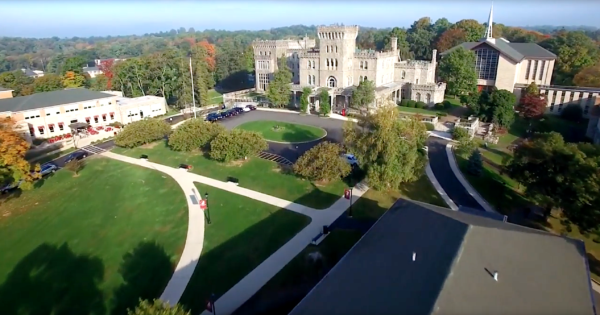Westchester college bucks national trend
Both the National Center for Education Statistics (NCES) and the National Student Clearinghouse Research Center (NSCRC) have been reporting data showing the same thing: the downward trend in college enrollment in the U.S. is continuing.
NCES is the primary federal entity for collecting, analyzing and reporting data related to education. NSCRC is an arm of the National Student Clearinghouse, a nonprofit providing colleges with reporting, verification and research services.
NSCRC reported that total college enrollment fell to 16.2 million this spring, marking a one-year decline of 4.1% or 685,000 students. This year”™s drop in undergraduate and graduate levels follows a 3.5% decline the previous spring, bringing the total loss in enrollment since the spring of 2020 to nearly 1.3 million students.
NCES reported that college undergraduate enrollment decreased from 17.5 million in the fall of 2009 to 15.9 million students in the fall of 2020.
In sharp contrast to what NCES and NSCRC have been reporting is what”™s been happening at least one Westchester campus, Manhattanville College in Purchase.
“Our incoming class this fall will show the largest year-over-year increase in decades,” Louise Feroe, Manhattanville”™s president said. “We are up 40% in new, first-year students and transfer students are increasingly choosing Manhattanville, showing a greater than 30% increase.”

Feroe said the college saw approximately 500 new undergraduate students and 200 new graduate students join its ranks. The college reported overall enrollment of 1,541 undergraduate students and 994 graduate students.
The college was founded in 1841 in Manhattan and moved to Purchase in September 1952. The college is on an approximately 100-acre campus that is the former estate of Whitelaw Reid, who was publisher of the New-York Tribune, which became the New York Herald Tribune. Reid also served as a U.S. ambassador to France and later to Great Britain.
“We”™ve changed our approach to marketing and the way that we want to portray ourselves as an institution,“ Troy Cogburn, Manhattanville”™s vice president for admissions and marketing told the Business Journals. “We are offering academic programs that I know are setting students up for a long career.”
Research by the Association of American Colleges and Universities and the Bipartisan Policy Center shows that while nearly 90% of employers believe a college degree is worth the personal investment, only 60% of all Americans agree. Their research found that 73% of survey respondents with a bachelor”™s degree and 74% with an annual income greater than $100,000 believe the investment in college education to be worthwhile.
Research by the Association of Public and Land-Grant Universities found evidence that a college degree significantly improves one”™s employment prospects and earnings potential. There also was evidence that bachelor”™s degree holders are half as likely to be unemployed as their peers who only have a high school degree and they make $1.2 million in additional earnings on average over their lifetime.

“We”™ve added our School of Nursing and Health Sciences less than three years ago and that”™s wildly popular,” Cogburn said, “We”™ve added a School of Arts and Sciences. We”™ve added several new Bachelor of Science tracks so students don”™t just have to automatically do a Bachelor of Arts degree. We”™ve enhanced accelerated degree program options that students find appealing because they can earn their bachelor”™s and their master”™s in five years and that along with our Career Development Office guiding them through internships really sets up students for that first professional job that will ultimately lead to their long-term career.”
Cogburn said the financial burden of going to college is real and he said Manhattanville does host financial workshops for students. The college posts its tuition for full-time undergraduates as being $19,830 per semester. Room and board costs vary but are in the area of an additional $8,000.
“The sticker price is not the actual cost of attendance that most students will pay,” Cogburn said. “We have quite a few scholarship opportunities, some that are merit-based and we have special opportunity programs. There are scholarships for first-generation students, which is one of the areas where we did see a student increase. We also have the Manhattanville Achievement Program, which although it”™s highly competitive and highly selective to get into, incorporates tutoring, mentorship and it also covers the cost of tuition, housing and a student”™s meal plan.”
Cogburn said that the recent announcement from the Biden Administration on providing $10,000 in student loan forgiveness and $20,000 in forgiveness for recipients of Pell Grants could be very beneficial for current students, alumni and even members of the college”™s staff who still may be paying off student loans.
“Because that policy is still so new I think the questions are still coming and right now we”™re trying to do our best job of sharing that information with the students in a proactive way so that it doesn”™t become something that”™s served with anxiousness and worry about whether or not they might qualify for some kind of assistance,” Cogburn said.
Cogburn said that along with the increase in enrollment this year, the college has seen an increase in the number of students who want to live on campus. About 32% of Manhattanville”™s students commute while 68% live on campus.
“We knew that more students were interested in that traditional college experience, especially after the last few years, but there are even more than we were planning for. That”™s exciting,” Cogburn said.